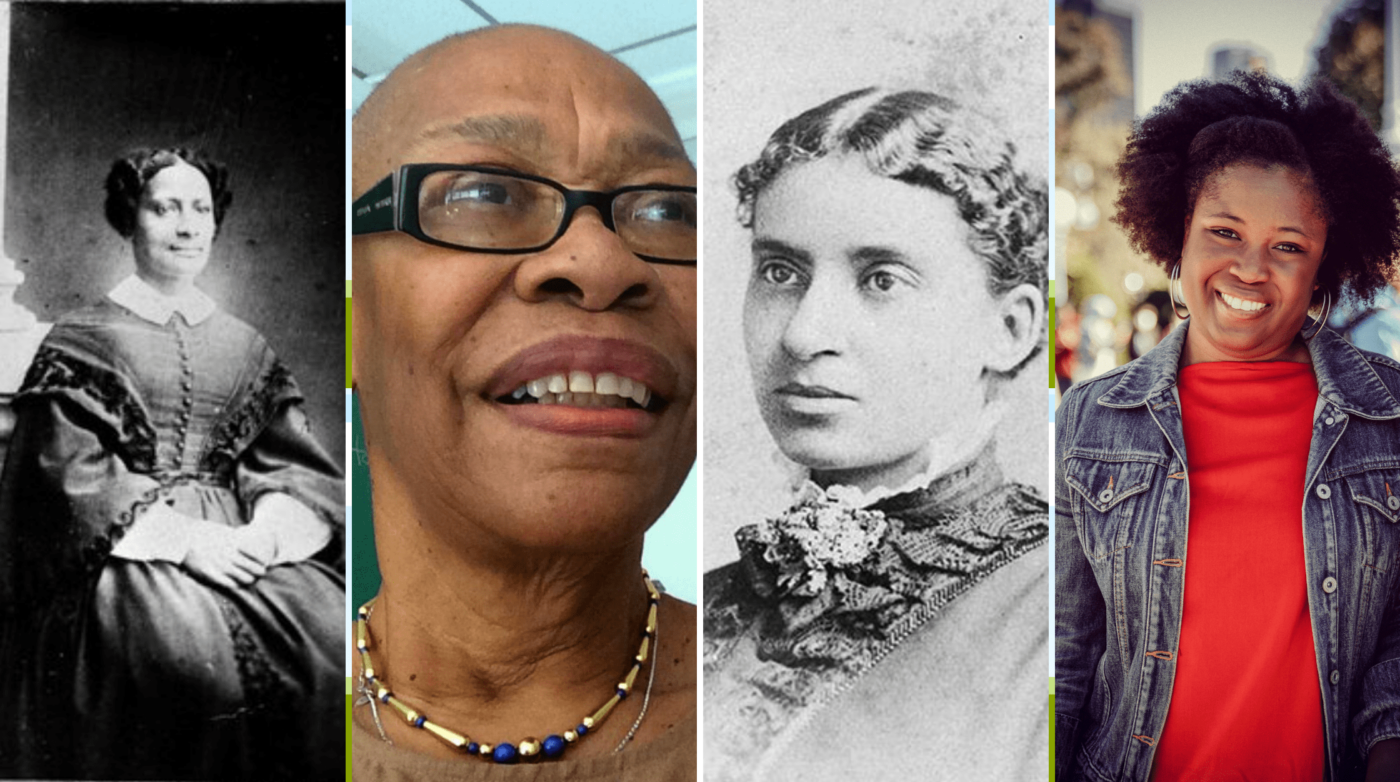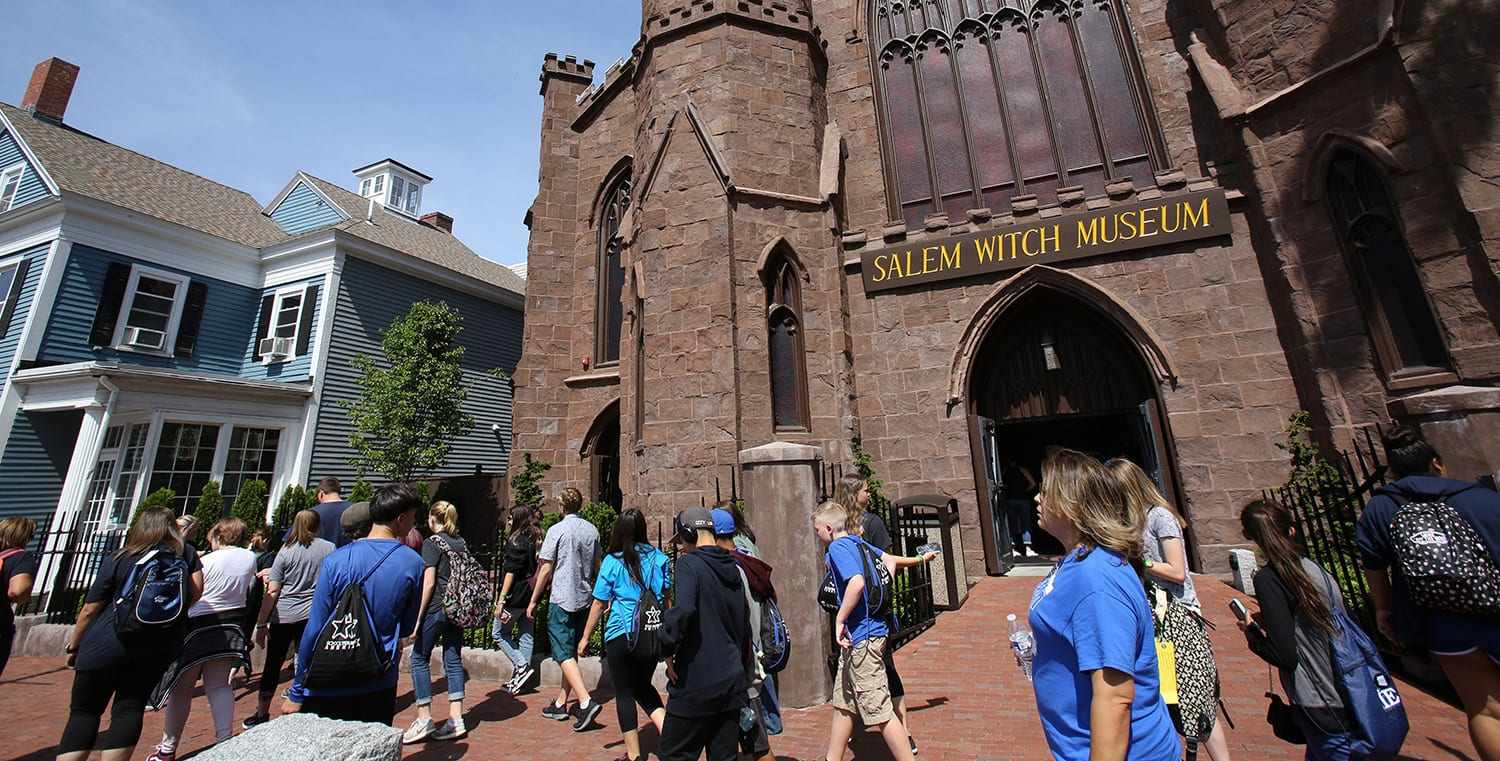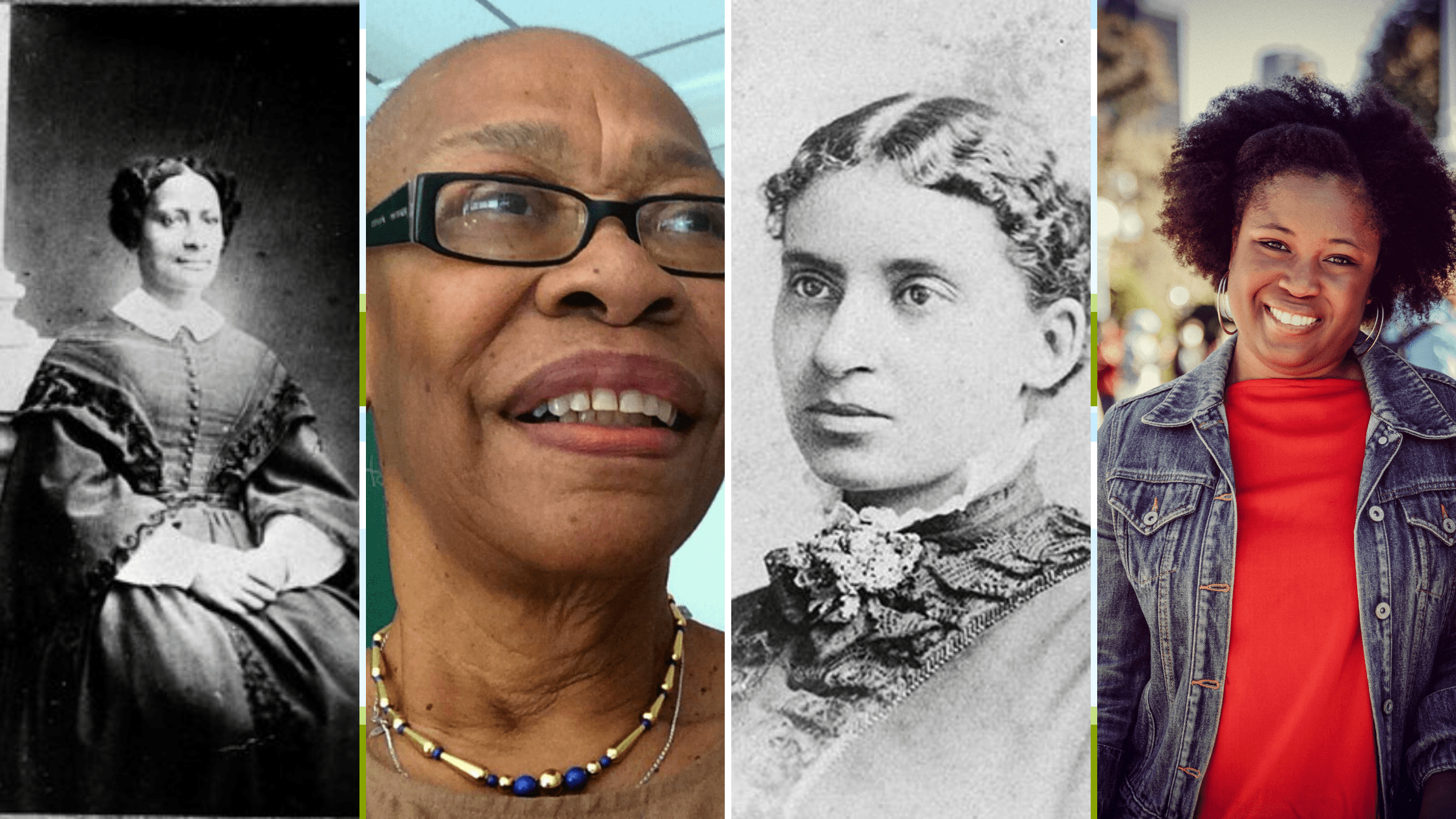
By Joey Phoenix
Everyone knows about Salem’s Witch History, but few realize the significance of its anti-slavery connection with its ties to The Underground Railroad – including a series of smuggling tunnels beneath the city of Salem itself, Frederick Douglass, and the Abolitionist movement of the early to mid 19th century.
Historical research and interpretation over the last few years have illuminated the contributions of two Black women abolitionists and philanthropists in particular: Charlotte Forten (Grimké) and Sarah Parker Remond.
In recognition of this, cultural institutions like Hamilton Hall, an organization with deep ties to the Remond family, have been amplifying this aspect of Salem’s history through a series of lectures and discussions, including the Spring Americana Series this past Sunday, April 18th.

Click here for Professor Rosemond’s suggested reading list.
Centering Black History at Salem State
Gwendolyn Rosemond (she/her/hers), a visiting professor of English of Salem State University – known as the Salem Normal School in Forten’s time – spoke this past Sunday, April 18th in a Virtual Americana Series Lecture at Hamilton Hall titled “19th Century Black Women Justice Seekers: Salem and Beyond.”
The talk featured Forten and the Remond family, women responsible for race uplift in their time, and the national organization that they helped to foster: The National Association of Colored Women.
Charles Lennox Remond (1810-1873) and his sister Sarah Parker Remond (1826-1894) were two abolitionists and members of the Anti-Slavery society who taught Fredrick Douglass when he lived in Lynn – Douglass was so affected by this friendship that eventually named his son after Charles Remond.
Both of the Remond siblings were prominent speakers, and travelled in the United States and abroad giving lectures on activism and Anti-Slavery.
Black Women Justice Seekers Salem and Beyond
Charlotte Forten (1837-1914), was Salem State’s first Black graduate and the daughter of two prominent abolitionists in Philadelphia. She was sent North by her father to study in integrated schools, and lived with the Remond family in Salem – who had been instrumental in reintegrating schools during that time. Forten kept many journals of her experiences, which have become useful source materials for interpretation today. She would also eventually become an educator, writer, and speaker herself.
“The work of these women amplified a movement that was already happening in Boston and nationally,” said Professor Gwendolyn Rosemond. “They helped to make it even bigger.”
Rosemond first became interested in Forten and Remond’s work in the 1980s soon after making the acquaintance of Joan M. Maloney, who was writing the history of Salem State University.
Rosemond and Maloney partnered to write a piece for the Salem University Sextant Journal called “To Educate the Heart,” which named Charlotte Forten as the first Black graduate of Salem State University and gave an in-depth profile of her life.

Charlotte Forten 
Sarah Parker Remond
“One of the most important things that Black women and especially Black women who are educators have always known is that if we were ever to dig out of bigotry and out of racism, and out of enslavement, and then the ramifications thereof, it would be through education,” said Rosemond.
“Education has been at the center of this movement, not only because it for many years was the only way we could find employment, but also because there was this belief that education would lift the race,” she added. “Because when youth learn about what’s possible, and they see it, they know they can become it.”
As a result of this work by Maloney and Rosemond, and the support of the new President of Salem State University, Nancy Harrington, and the eventual added support of Mayor Kim Driscoll, both Charlotte Forten and the Remond family have been honored with city parks dedicated to them at 289 Derby Street and 1 Bridge St, and their words and activism have started to infiltrate public discussions around Salem history.
“The deeper you go into Charlotte’s history, the more you begin to discover Black women and the Black women’s movement, because it’s all connected,” Professor Rosemond said, mentioning that in the lecture she intends to not only go into detail about these women, but about other local activists and abolitionists as well.
Telling Untold Stories at Hamilton Hall Salem
Historical institutions have both a unique opportunity and responsibility to curate exhibitions and create events that correctly interpret historical events for the public to discover and understand. This is sometimes a difficult task when the historical record has either been tainted by racial bias or contains informational gaps.
“History segregates. I didn’t learn about Black leaders in school, especially not Black women leaders. It seemed that history only represented white men,” said Rosemond, mentioning that while school prevented her from learning the full scope of history, her home was a refuge filled with that knowledge.
Hamilton Hall, which started out its life as a social club before evolving into its current iteration as a nonprofit historical institution and its increasingly more important role as community organization, is doing their part to educate the public on local history and relevant issues.
For the past 75 years, they’ve been hosting a noteworthy speaker series, which has become increasingly more progressive over time.
“The lecture series content has always been worldly and forward focused, which isn’t surprising given the progressive nature of Salem,” said Michel Selbst (he/him/his), President of the Board of Directors for Hamilton Hall.
What has also come out of this research is the Remond family connection – specifically that of Sarah Parker and Charles Lenox’s parents John Remond and Nancy Lenox – is the strengthening priority for Hamilton Hall to bring some of these often invisible, untold stories into the public purview.
“We at Hamilton Hall initially had a narrow understanding of the Remond family, and that we now appreciate their wide and varied business interests and the important role they played in the advancement of African Americans in Salem and beyond,” said Selbst. “It’s an impact we still feel today.”
Yet, despite this very obvious and important historical connection, learning about the Remonds and their connection to Charlotte Forten and the greater abolitionist movement hasn’t always been easy. To fill in some of the informational gaps, Hamilton Hall has fortunately been able to rely on in-depth meetings notes leading back almost three centuries.
“John Remond, for example, ran one of the annual meetings at Hamilton Hall in the 1830s, which was incredibly unusual for that time and speaks to how much respect people had for him and his family,” Selbst said.
But historical lectures and designated exhibitions aren’t the only ways that this knowledge is being shared. Organizations like History Alive Inc. have produced immersive, travelling theatrical performances which have highlighted the contributions of these women abolitionists.
Most notably, the 2019 production of This Is Not a Bill, written by Black playwright Alexia Rowe (she/her/hers), is centered on Salem’s involvement in the Underground Railroad in the mid-19th century. New Hampshire-based Samantha Searles (she/her/hers), a Black youth activist responsible for creating the local Black Lives Matter chapter in Nashua, was cast in the leading role as Charlotte Forten for the production.
Representing Black Excellence in History in This Is Not a Bill
Beneath the city of Salem lie a series of tunnels which were used to transport enslaved people during and after the Civil War, and under the Essex Bank Building on Essex Street there is even a tomb of two enslaved persons who died while seeking their freedom.
While visitors to Salem can take a “Smugglers Tour” and learn about both the Underground Railroad in the 19th century and bootlegging in the 20th, up until recently there were no real historical interpretations or public education concerning the history of these tunnels.
In Spring of 2019, the year that Charlotte Forten Park was dedicated, History Alive Inc. produced the immersive traveling show This Is Not a Bill, written by Black Playwright Alexia Rowe.
In the play, free-born abolitionists Sarah Parker Remond and Charlotte Forten, as well as the audience in their role as workers on the Underground Railroad, help two previously enslaved persons, Patty and Athumani, seek their freedom in the North in the time of the Fugitive Slave Act.
“We followed the lines above ground which mirrored the many tunnels under Salem, under Old Town Hall, that were used for hiding runaways. Salem was one of the last steps on the way to Canada,” said Samantha Searles (she/her/hers) a journalism student at Suffolk University on path to graduation this Spring and Black Lives Matter activist who played Charlotte Forten in the production.
“And while the North was far safer than the South in those times, there were still Bounty Hunters chasing them, and it added a level of realness having them chase us in the production.”
One of the most important parts of this work for Searles was that, in a culture where representation of Black women in theatrical productions is few and far between, especially in historical theatrical productions, she had the opportunity to portray one history’s greatest Black women heroes.
“It was a dream come true,” she said, adding that she had always loved historical reenactment and visited Colonial Williamsburg whenever possible. “Being able to portray a black woman in New England was something I never thought I’d get the chance to do. And then to also play one who was so close to my own age and so instrumental [in this movement]. It was an honor.”
It’s no coincidence that this opportunity existed a Black playwright and songwriter was the one chosen to tell the story. Alexia Rowe (she/her/hers) – a singer-songwriter, playwright, and recent graduate from Gordon University – partnered with History Alive, Inc. for the production. During the writing process she quickly became frustrated with how little information there was about the rich Black history in the city.
“There was a single African-American tour on an app for people to use, but it was self-directed and so impersonal,” said Rowe. “There’s a lot of Abolitionist and Black history in Salem, but there was not really enough being done to educate people about it.”

Samantha Searles 
Alexia Rowe – Image by Salma K Photography
Fortunately, Rowe was able to pull from a lot of primary source material about Forten and Remond to use in the play. It seemed that while the resources existed, it was just becoming a matter of connecting the dots.
“Salem history has been all about witches,” said Rowe. “And it’s overshadowed what’s for me a far more important history.”
Writing historically accurate stories centered around prominent Black individuals has become a benchmark of Rowe’s work over the last few years. A recent piece she is working on features a Jamaican-born Irish girl living in Ireland trying to figure out her place in the world as an outsider.
“What led me to write This Is Not a Bill is also what led me to work on the piece that I’m currently working on, that there are stories here that need to be told. And no one is telling them,” Rowe said.
“It’s fascinating to look at these pieces of history that no one knows about instead of writing stuff that’s already in the world. It’s why I do my work, it’s why I tell these stories,” she added.
Joey Phoenix (they/them) is the Director of Brand Strategy and Innovation at Creative Collective. As the resident storyteller and town crier, they encourage you to send story ideas, inspiration, or pictures of adorable critters to joeyphoenix@creativecollectivema.com.

Creative Collective is celebrating the ways we can get outside this Spring with their #SpringOnTheNorthShore campaign, an initiative created to highlight the best that springtime North of Boston has to offer on the longer, warmer days.
Area businesses can participate in the event by using the hashtag #SpringOnTheNorthShore and tagging @creativecollectivema and @creativenorthshore in posts on social media highlighting ways their businesses are encouraging people to get out and explore the best of the region this Spring.













